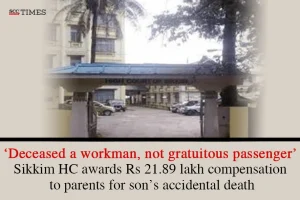Sikkim High Court: The appeal was initiated under Section 166 of the Motor Vehicles Act, 1988 (the ‘MV Act’) by the claimants, parents of the deceased, challenging the rejection of their claim by the Motor Accident Claims Tribunal (the ‘Tribunal’), which held their deceased son to be a gratuitous passenger and not a workman covered by insurance policy. A single Judge Bench of Bhaskar Raj Pradhan, J., set aside the Tribunal’s finding, and stated that the deceased was a workman not a gratuitous passenger and since the accident occurred when the insurance policy was effective, the claimants would be entitled to “just compensation” of a total amount of Rs 21,89,100.
Background:
On 20-04-2023, the son of the claimants (hereinafter deceased), died in a motor vehicle accident while travelling from Rorathang to Bering. The claimants filed an application under Section 166 of the MV Act seeking Rs 22,41,000 as compensation. The claimants asserted that the deceased was working as a daily wage labourer in the accident vehicle to unload sand when the accident occurred.
The Insurance Company denied the claimants’ assertion that the deceased was a workman working as a daily labourer in the accident vehicle, and further alleged that the deceased was a gratuitous passenger who had merely taken a lift in the accident vehicle, as both the deceased and the driver were from the same village. It relied on a Motor TP Claims Investigation Report made by the Insurance Investigator who also submitted that the deceased was a gratuitous passenger in his report.
The accident vehicle owner in his written objection admitted that he had required five bags of sand which were loaded in the accident vehicle and the deceased boarded the accident vehicle to unload the said five bags but unfortunately before unloading, the accident vehicle met with an accident. He further contended that the deceased used to travel and did petty work in the accident vehicle. Moreover, he had paid an additional premium for insuring his liability to workmen.
The Tribunal had rejected the claim of the claimants on the ground that the deceased was a gratuitous passenger in the accident vehicle and not a workman or a helper in the accident vehicle.
Analysis and Decision:
The Court took note of the suggestion that “workmen” in the insurance policy had the same meaning as in the Workmen Compensation Act, 1923 (the ‘Act’) and by the 2009 Amendment (effective 18-1-2010), the Act was renamed Employee’s Compensation Act, 1923 wherein the Section 2(dd) defined “Employee” to include driver, helper, mechanic, cleaner, etc., connected with a motor vehicle, thus making the deceased as an “Employee” and a “workman” under the insurance policy.
The Court emphasised that the best person to depose as to whether the deceased was a workman would be the owner of the vehicle and since he had clearly pleaded that he required five bags of sand to repair the drain of his house which was loaded in the accident vehicle and subsequently the deceased boarded the accident vehicle to unload the said five bags of sand belonging to him, would amount to an admission to the claim of the claimants that the deceased was a workman under the owner.
The Court noted that the Insurance Investigator did not record the evidence of the people acquainted with the facts of the case and produce it in the Court, making the report based on mere hearsay evidence at the instance of the Insurance Company. The Court further opined that the claim of the Insurance Investigator, that the deceased was a gratuitous passenger, was based on hearsay knowledge from persons who did not enter the witness box, but, on a preponderance of probabilities, the evidence on record clearly suggested that he was a workman working with the owner and engaged for the unloading of sand in the accident vehicle when the accident occurred.
The Court emphasised that the insurance policy reflected that an additional premium was paid by the owner for liability to workmen and since the accident occurred while the insurance policy was effective, and the deceased was in the accident vehicle when it met with an accident, which was a consequence of the rash and negligent driving of the driver, the owner was vicariously liable for the rash and negligent driving of the accident vehicle by the driver, who had been duly authorised by him. The Court further noted that, since the Insurance Company had indemnified the owner of such a liability through the insurance policy, the Insurance Company would be required to make good the compensation payable to the claimants, as they were the parents of the deceased.
The Court, therefore, set aside the Tribunal’s judgment while allowing the appeal, and directed the Insurance Company to pay the amount of Rs 21,89,100 with a simple interest at 9 per cent per annum from the date of filing of the claim petition till the date of realisation, failing which a simple interest at the rate of 12 per cent per annum shall be payable until its final realisation.
[Prem Bahadur Rai v. United India Insurance Co. Ltd., 2025 SCC OnLine Sikk 68, decided on 10-7-2025]
Advocates who appeared in this case :
For the Appellants/Claimants: Umesh Ranpal and Rubusha Gurung, Advocates
For the Respondents: Pramit Chettri, Advocate

